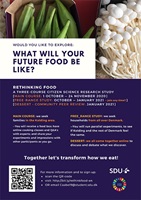Our food practices and supply chains are driving ecosystem breakdown. We must urgently transform how we eat. However, doing so is not straightforward, because what and how we eat helps to make us who we are.
From October 2020 – February 2021, families and households across Denmark are invited to reflect on how the Future 50 Foods report might help them become more sustainable in their eating habits. To connect daily food and eating practices with global sustainability agendas, we
use participatory approaches to research through design. Researchers and citizens work together to interrogate sustainability agendas through: making, eating, sharing, community-based analysis and peer-review. The result is a three-course inquiry into bottom-up food system transformation:
- Main Study: Oct-Nov 2020, 35 families living Kolding, Denmark—22 in the city and suburbs, 12 in the surrounding countryside. These families meet the researchers, receive food boxes and have direct engagement with the researchers and chef, as they explore the Future Foods.
- Free-Range: Oct 2020-Jan 2021, unlimited participants—families or households, from across Denmark. These participants access prompts and activities through an online portal. They can participate in a nation-wide online dinner to discuss food, eating and sustainability. Supplementary media presented by the national broadcaster, Denmark's Radio (DR), week 46, 2020.
- Dessert: March-April 2021. All interested parties come together for an online community analysis and peer-review process. The aim is to challenge, develop and confirm the researchers’ findings
Emerging Findings: The Main Course has been running since 3 October. We undertook two pilot studies earlier in the year. In general, the families seem open-minded and, for the most part, enthusiastic about transforming their eating behaviours. They are even willing to compromise on taste and flavour for more sustainability. However, time and cost exert very real pressures; and children’s willingness to experiment can also be an issue. As the study unfolds, we will learn much more.
Limitations: Our Main Course participants, are predominantly middle-class Danish families. We hope to achieve more diversity through the Free-Range course. At the same time, we recognise that middle class Danes are by far the most dominant demographic in Denmark, so if they can change how they eat, and the demands they are making on the local food system begin to reflect those changes, it will hopefully make eating sustainably more accessible for others who may not be quite as privileged.
• Project Flyer • Poster presented at 2020 EU Citizen Science SDG Conference
Last Updated 10.01.2023

